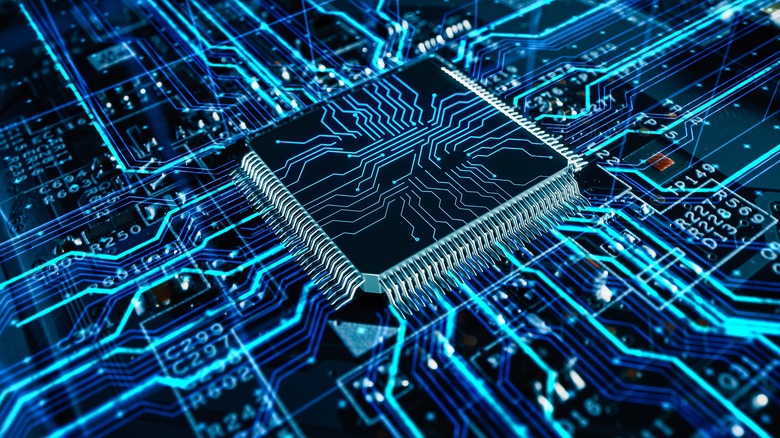What Is Quantum Computing And Why Is It So Hard To Explain?
We may receive a commission on purchases made from links.
You've probably heard the term "quantum computing" at some point and wondered what it meant. It's not a term that's easy to understand, and neither is quantum mechanics, which is the theory behind the concept of quantum computers. The term "quantum" is thrown around a lot these days, and they even made a running joke of it in "Ant-Man and the Wasp," where Ant-Man asked, "Do you guys just put the word 'quantum' in front of everything?" (Don't even get us started on "Quantumania.")
It was a fair question because that movie and many others toss around the word "quantum" like a magical explanation for technology a layperson cannot understand. This can seem true in real life because for anyone who doesn't understand quantum mechanics, hearing the word "quantum" to describe computers sounds odd. Quantum computing isn't a simple concept, and while some people understand its potential, it's not something a layperson can't grasp.
If you count yourself among the masses who don't understand quantum computing, you're in luck. This article delves into the concepts surrounding quantum computing and explains them as simply as possible. Of course, it's not a simple theory, but once it's broken down, it's a little easier to understand. That's not to say it isn't incredibly complex and based on detailed scientific theories, but if you have a basic understanding of computing, understanding quantum computing shouldn't be too difficult to grasp.
What quantum means in regards to computers
The term "quantum computing" is a multidisciplinary field centered around making computers that function differently from standard binary computer systems. Computers, your phone, and most electronic devices function based on a binary, base-2 system, where the number one is the electrical signal for "on" and a zero is the electrical signal for "off." These are called bits, and eight of them make up a byte. Binary computing gives us the Internet, self-driving cars, and much more.
Quantum computing is different because instead of a binary system, it functions using four principles of quantum physics. Don't worry; you don't need to understand quantum physics to understand how this works. The four principles are Superposition, Interference, Entanglement, and Measurement. Superposition allows for a quantum state to be both on and off at the same time, while Interference allows for an object to cross its own path and interfere with another particle.
Interference essentially allows for a particle to not cancel out the other particle, or they can be added to one another. Entanglement is where it gets tricky because it allows for an object's state to be entangled with another, and neither can be described without also describing the other. Finally, Measurement states that measuring an object forces it to turn into a classical state, so the act of measuring alters the state of an object. What this all means is that using the principles of Quantum Superposition, a bit, or "qubit," can be both a zero and a one at the same time.
How does this apply to computing?
What this all means is that computers using binary systems can create complex systems and analyses, but they're limited by several physical factors. Quantum computing utilizes quantum physics to create incredibly complex systems, much faster than standard computers. Theoretically, a fully functioning quantum computer could break the most complex cryptographic encryption in a short time, while the most advanced binary supercomputer could take exponentially longer, or it wouldn't be able to complete the operation at all.
Currently, there are no fully functioning quantum computers capable of performing more efficiently, faster, or cheaper than their binary counterparts, but they are in development by several nations and corporations. Creating a quantum computer is no easy task, and they require several components: a quantum data plane, which includes the physical qubits and the hardware needed to hold them in place. The control and measurement plane converts digital signals into usable analog or wave control signals capable of performing quantum operations.
The control processor plane and host processor are what utilize the quantum algorithm alongside quantum software to provide a digital signal or bits to the control and measurement plane. Those are the main components, and there's plenty more, but the most important thing to know for quantum computing is that quantum computers use quantum physics to perform functions at a faster rate than current binary computer systems. Essentially, quantum computing is the next step in computer development that will move beyond what is currently technologically possible.


